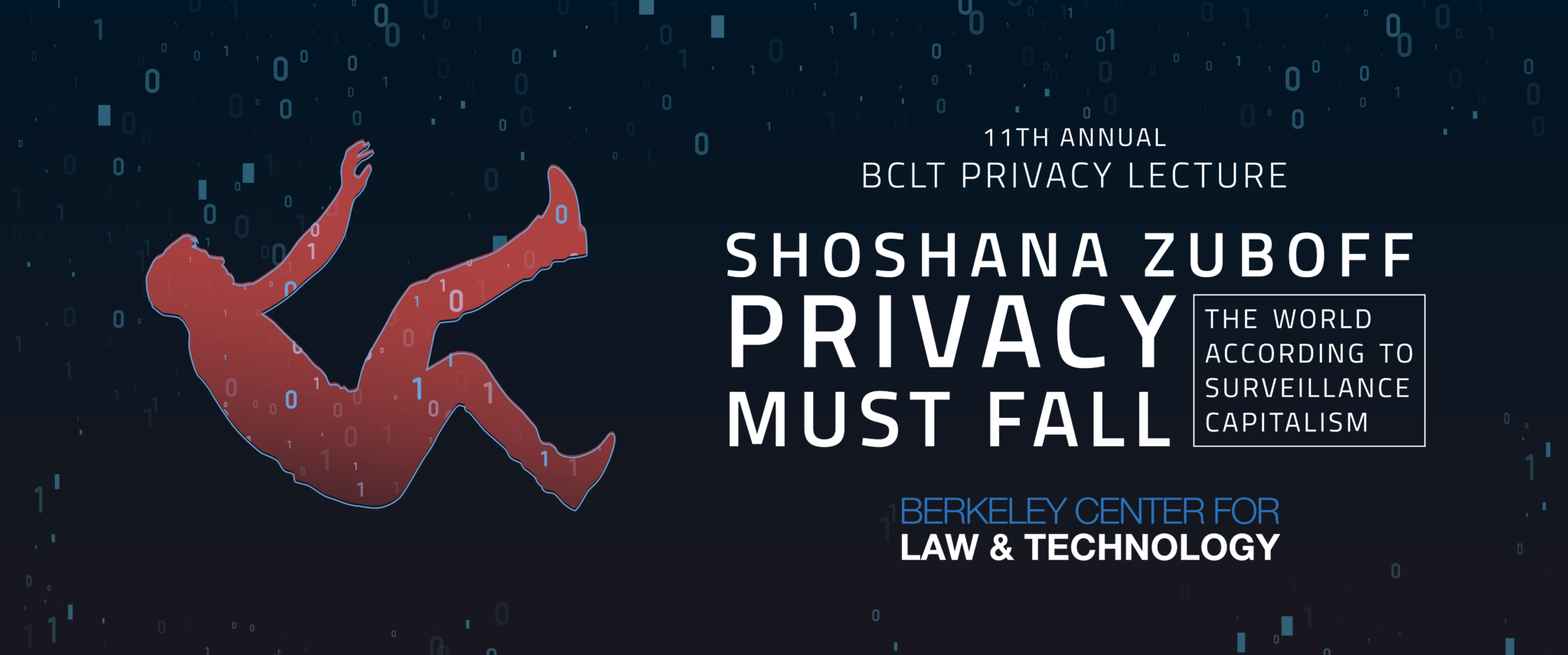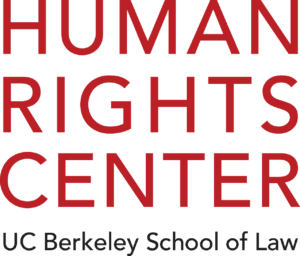11th Annual BCLT Privacy Lecture
by
Professor Shoshana Zuboff
“Privacy Must Fall”
The World According to Surveillance Capitalism
March 14, 2019
International House
UC Berkeley
2299 Piedmont Avenue
Berkeley, CA
Program
3:00 P.M. – Doors Open
3:30 – 5:30 P.M.
Welcome
Jim Dempsey, Executive Director, BCLT
Presentation of BCLT Privacy Award to Joel Reidenberg
Paul M. Schwartz, UC Berkeley Law School
Introduction of Shoshana Zuboff
Chris Jay Hoofnagle, UC Berkeley School of Information
and Law School
Lecture:
“Privacy Must Fall:”
The World According to Surveillance Capitalism
Shoshana Zuboff, Harvard Business School (retired)
Commentary:
Maria Brincker, University of Massachusetts, Boston
Brett Frischmann, Villanova University Law School
5:30 – 6:30 P.M. – Reception
Shoshana Zuboff’s Theory of Surveillance Capitalism
What is the problem? Not technology… not a corporation… The problem is surveillance capitalism, a new logic of capital accumulation that founds a burgeoning surveillance-based economic order. Surveillance capitalism originates in the unilateral claim to human experience as the source of free raw material for its hidden commercial practices, including the extraction of behavioral data, the fabrication of those data into predictions of human behavior, and the sale of those prediction products in new behavioral futures markets. Surveillance capitalism is a born-digital market form governed by novel and even startling economic imperatives that produce unprecedented asymmetries of knowledge and power. The stark new social inequalities that characterize this market project enable new forms of economic and social domination, while challenging human autonomy, elemental and established human rights, including the right to privacy, and the most basic precepts of a democratic society.
How should we frame this problem? The legal framework (privacy law) and the economic framework (antitrust) are each necessary but insufficient. The higher-order framework is social: the division of learning in society.
With the rise of industrialism in the late nineteenth century, the division of labor became the axial principle of economic and social order. The shift toward information economies means that the division of labor is subordinate to the division of learning as the axial principle of social ordering in the twenty-first century. Three essential questions shape the division of learning in society: Who knows? Who decides? Who decides who decides?
In the year 2000, many foresaw the Internet as a powerful force for the democratization of knowledge and therefore of a more just division of learning. Since then, surveillance capitalism’s abrupt rise to dominance alters this trajectory. Its ever-expanding global architectures of behavioral extraction and datafication continuously widen its advantages in the accumulation of proprietary stores of knowledge and the attendant instrumentarian power to act on that knowledge. Right now it is primarily the surveillance capitalists and their market operations who know, who decide who knows, and who decide who decides.
A century ago Durkheim warned of the dangers of a pathological division of labor in which the principles of organic solidarity were subverted by the private forces of industrial capital. Today the rise of surveillance capitalism represents the unauthorized privatization of the division of learning in society, which becomes the canvas for a bold, extractive, and still poorly understood market project. The result is a pathological division of learning in society that originates in and produces unprecedented inequalities of knowledge and power. This pathology thrives without legitimate political authorization. In the absence of meaningful democratic controls, surveillance capitalism’s economic imperatives dictate that privacy must fall––collateral damage of this hidden coup from above.
What is to be done? Surveillance capitalism and its discontents must be named in order to be tamed. This is our new collective challenge. Ultimately our fate and that of generations to follow depend upon asserting democratic control over the essential questions of the division of learning in society. Who knows? Who decides? Who decides who decides? How will we answer?
Commentary by:
-
Big Other: Surveillance Capitalism and the Prospects of an Information Civilization, 30 Journal of Information Technology (2015) 75–89, View paper.
-
Secrets of Surveillance Capitalism, Frankfurter Allgemeine Zeitung (2016), View paper.
Event Co-sponsored by:
Berkeley Information Privacy Law Association (BIPLA)
UC Berkeley Human Rights Center
UC Berkeley has certified 2.0 hours of Continuing Legal Education (CLE) credit and 2.0 hours of IAPP Continuing Privacy Education (CPE) credit for this event.

